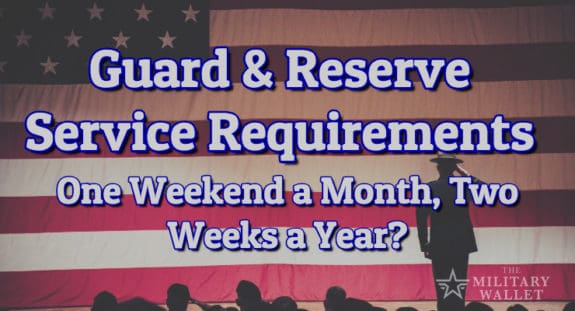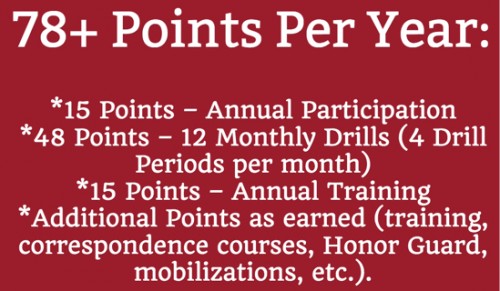If you have heard of the National Guard or the Reserves, you have probably heard the phrase, “One Weekend a Month, Two weeks a Year.”
Perhaps you saw it on a billboard or TV advertisement. Maybe you heard it from a recruiter or while you were on active duty. One Weekend a Month, Two weeks a Year is a quick and dirty reference to the minimum service requirements for members of the Guard and Reserves.
I’m here to tell you that phrase is completely true. But it can also be a wildly inaccurate representation of the service commitment made by members of the Guard and Reserves.
One Weekend a Month, Two weeks a Year is the minimum service requirement Reserve Component members are scheduled to serve. However, it’s more of a guideline than a hard and fast rule. It’s possible to serve much more than that in a year, up to and including serving full-time. Members can also serve less than this amount and still earn a Good Year toward retirement.

Let’s take a deeper look at Guard and Reserves service requirements. We’ll start with a question about Guard and Reserve training, then dive deeper into the minimum annual service requirement you can expect, and the reality of what it means to serve in the Guard and Reserves. This article will serve as a primer for anyone considering joining the National Guard or Reserves.
Guard and Reserve Initial Training Requirements
What follows is a recent question we received from a reader who is thinking about joining the Guard or Reserves (branch to be determined).
Hello Ryan,
I am interested in potentially joining the military (Air Force or Marines), likely in a National Guard or Reserve capacity. I’m having a hard time finding out how (if at all) the training / tech school differs for Reserve/Guard members. I’ve read that you can train “closer to home”, but have struggled to find anything to back it up.
Your podcast has been invaluable to me thus far in my research. Thank you for your time, effort, as well as your service.
Thank you for contacting me, and I’m glad my podcast has been helpful.
This is a great question. You’re probably having difficulty finding this information because tech school training doesn’t usually differ for members of the Guard and Reserves.
For the purposes of initial military training, the Guard and Reserves are extensions of active duty. Members undergo the same basic training, followed by the same tech schools as their active duty counterparts. Some tech schools may require follow-on training or seasoning days, in which the member performs some additional training at their unit, an active duty base, or in another tech school. Their service differs only after they complete basic training, tech school, and any required follow-on training (if any).
After initial training, the member then reports to their Guard or Reserve unit and is then on the standard Guard or Reserve schedule, which is often referred to as “one weekend a month, two weeks a year.”
ADVERTISEMENT
Annual Training Requirements, or One Weekend a Month, Two Weeks a Year
The phrase, One Weekend a Month, Two Weeks a Year refers to the minimum service requirement Guard and Reserve members are scheduled for each year. But it can vary dramatically, which we will cover.
The one weekend a month refers to the normal monthly drill assembly (also called a Unit Training Assembly, or UTA). This is further broken down into two days, each of which is two drill periods, for a total of four drill periods per drill UTA.
The two weeks a year refers to two weeks of Annual Training (also called AT days). These two weeks can be done either individually or as a partial or full unit, depending on how the base or unit schedules the training.
The weekend drill assemblies are generally served at your unit. This is why serving in the Guard or Reserves is often referred to as “serving closer to home.” Of course, this is relative, as you may have a commute to your unit (in some cases, you may be eligible for travel reimbursement).
The two weeks of Annual Training can be served at different times or locations based on unit needs or scheduling requirements. Many units schedule these two weeks during the summer, but there is no standard rule.
Some bases may schedule everyone to serve their AT days at the same time and location. This is more common in branches requiring larger units to perform their duties. For example, an Army Reserve unit may require an entire company or battalion to report at the same time and location for field training. The Air Force may require an entire flying squadron and support units to perform training missions together. This is the only way these units can train to work and fight together.
Other units may be able to function on a smaller scale. So they may be able to serve their AT days at a different time and place. Some members may even be able to serve their two weeks of Annual Training on an individual basis on their schedule.
This distinction is important to understand because in some branches of the military and some career fields, you will be required to serve your two weeks a year in a fixed time and place with everyone else. However, members of other military branches and career fields may have more flexibility in their Annual Training requirements.
Earning a Good Year in the Guard and Reserves
It’s important to understand the annual service requirements, how you earn points for your service, and how they add up to qualify for a Good Year or a year credited toward retirement.
Members must earn 50 Points to qualify for a Good Year toward retirement.
20 Good Years qualify a member for Guard / Reserve retirement benefits. Active duty time counts toward retirement, so you may already be on your way to earning a military retirement if you are current or former active duty, and are considering joining the Guard or Reserves. This podcast / article discusses the finer points of the decision process.
Each type of service earns Retirement Points. The points break down like this:
- 15 Participation Points for membership in the Guard, Reserves, or Individual Ready Reserve (IRR)
- 1 Point for each day on Active Service (Active Duty, Active Duty for Training, and Annual Training tours)
- 1 Point per Drill Period (Each Drill weekend normally has 4 Drills, so this is good for 4 Points on a normal Drill weekend).
- 1 Point for serving in an Honor Guard for Funeral Honors Duty (normally capped at 1 Point per day, regardless of the number of funerals in which you serve as an Honor Guard).
- 1 Point for each three study hours of qualifying military correspondence courses.
How Many Points Should You Earn in a Year?
Members who serve the minimum number of scheduled days should earn approximately 78 Retirement Points per year.

One Weekend a Month, Two Weeks a Year, breaks down to 78 points per year:
- 15 Participation Points
- 48 Points from Drill Weekends
- 15 Annual Training Points
- = 78 Points
You get 15 participation points, just for being a member of the Guard and Reserves. This is automatic.
Each Drill Period is worth one retirement point and one day of base pay. There are two drills per day, for a total of 4 drill periods per drill weekend.
Finally, you have the “two weeks per year” which is 15 days. (Trivia: why is two weeks 15 days? I don’t know. I’ve seen people quote 14 and 15 days; use this as a ballpark estimate).
Can You Earn More Retirement Points?
Absolutely. This is a topic unto itself, as there are many, many ways to earn additional retirement points. This can include performing additional training, being activated or mobilized, Professional Military Education (PME), taking certain correspondence courses, serving on an honor guard or burial duties, temporary active duty, and much more.
Federal law limits the number of inactive duty points you can earn each retirement year.
- Reserve year ends on or after 30 Oct 2007: max of 130 Points
- Reserve year ends on or after 29 Oct 2000: max of 90 Points
- Reserve year ends on or after 23 Sep 1996: max of 75 Points
- Before 23 Sep 1996: max of 60 Points
These limits only apply to inactive points. Active duty points don’t count toward that limit. The maximum number of total points you can earn each year is 365 (366 in leap years).
Can You Miss Training Days, UTAs, or Annual Training And Still Get a Good Year?
This is the dirty little secret you never hear about in the Guard and Reserves (at least, until you’ve been around the unit for a while). It may be possible to miss a certain number of training days, UTAs, etc, and still earn a Good Year toward retirement. But you have to tread carefully here.
As you read above, members are scheduled for enough training to earn about 78 Points each year. But you only need 50 Points to earn a qualifying year toward retirement.
Why is this?
The basic answer is that officials understand not everyone can make every single unit drill assembly. Or they may be unable to take off the two weeks for their Annual Training. This could be for personal, medical, or professional reasons.
So it can be possible to miss one or more drills or the Annual Training and still earn a Good Year.
But here is the kicker – you need to get written permission from your unit, or you risk missing out on a Good Year. In fact, you can have the requisite number of Points and still not earn a Good Year if your unit determines you did not earn it (most commonly for too many unexcused drill absences, or other administrative problems).
Note: I’m not an expert on this exact situation, so this is something you would need to take up with your base legal department or personnel section if you believe it may apply to you. My recommendation is always to have a written record of excused absences, so you have the required documentation for your service records.
ADVERTISEMENT
Drill Attendance and Annual Training Participation is Important – for You and Your Unit
My recommendation is to do your best to attend every UTA and do your AT days if possible. Most units have required training and appointments you need to attend during your Drill weekends. Missing out on those can make it difficult to stay on top of your training requirements. And your two-week annual tour is a great time to become more proficient in your military duties. Missing that time may make you less effective in your unit.
If you miss a Drill, I recommend trying to make it up if or when possible*. I have done this a couple of times. For example, I missed a Drill Weekend while my family and I relocated to a new state. I made it up the following month by coming in two days early. This gave me four consecutive Drill days, which is a great way to accomplish a lot in a short amount of time.
*There are two date considerations when making up Drill dates and UTAs: The first is the fiscal year (which always begins on Oct. 1), and the second is your Anniversary Year End (AYE), which is the anniversary of the date you joined the Guard or Reserves. You can find this in your annual points statement or through your personnel or human resources office. You will need to make up missed Drills or UTAs before your AYE for it to count toward your Good Year, and you may need to schedule certain events around the fiscal year, when budgets can become tight.
ADVERTISEMENT
Can You Skip the Two Week Annual Training Requirement?
The two-week Annual Training is a normal service requirement and is usually considered part of the minimum service requirement for the year. However, it can, and often does, vary based on the branch of service, unit, and career field.
Some members may find they serve well more than the two weeks of Annual Training. Members can also receive orders for additional training requirements or be activated for other reasons, including deployments, mobilizations, disaster relief, and more.
Members may also have the two weeks waived for various reasons and still earn a Good Year.
In some cases, the member may participate in training outside their unit and have that take the place of their Annual Training days.
For example, in three of the last four years, I did not serve the two-week Annual Training (AT) with my unit. Instead, I was on Active Duty for Training orders (ADT), including two different tech schools (each two months long) and Officer Training School, which was nine weeks long. My unit allowed these training events to stand in for my two weeks of Annual Training.
While this may seem like the same thing on the surface, the days are actually coded differently, and the funding comes from different budgets. Had I wanted to, I could have asked my unit to allow me to perform the AT days. This would mean more Retirement Points and more pay. But also more time away from my family.
Some units may or may not give their members the option. Remember, as I wrote above, your ability to waive your AT days will depend entirely upon your branch of service, your unit needs, your career field, current training needs, and other factors.
Some Guard and Reserve Members May Serve Much More Than Average
Everything written so far is based on the minimum service requirement. But many Guard and Reserve members serve much more than the minimum. There are many reasons for this, including their unit needs and career field, because they volunteered to serve additional days, mobilizations, deployments, being activated, and many other reasons.
Some members serve in career fields with high operations (ops) tempos. Some career fields allow their members to serve almost as many days as they want (common with flight crews, Remotely Piloted Aircraft (RPA) crews, special ops, certain medical fields, and other high-demand or undermanned career fields).
Some members also volunteer for orders as often as possible, picking up orders whenever an opportunity arises.
How Much Time Can You Expect to Serve in the Guard and Reserves?
If all of this sounds vague and slightly complicated, that’s because it can be. You may be able to breeze through several years in the Guard or Reserves and never serve more than the minimum number of days. And another member in your unit may serve twice as many days as you.
In other words, even people in the same unit may have very different duty requirements based on their career field, training needs, availability, and other factors.
The best advice for someone considering joining the Guard or Reserves is to contact a recruiter at your prospective unit and ask them about the unit mission, ops tempo, current needs / open jobs, and what you may be required to do in one of those jobs.
If possible, you may be able to interview one of the members of your prospective career field to get a better understanding of the day-to-day job, training requirements, ops tempo for that job, the likelihood of deployments or mobilizations, and any other relevant questions you may have.
Serving in the Guard and Reserves Requires a Major Commitment
Overall, serving in the Guard or Reserves requires a commitment of yourself, and your family, if you have one. You may only be required to serve on a part-time basis. But you may also be required to serve up to a full-time basis if you are activated or mobilized. So, it can require a commitment from your employer as well. This last point is important, as you may be required to spend time away from your civilian job. The good news is employment protections are in place through the USERRA program.
USERRA is a federal law that covers Employment Rights for Active Military, Guard, and Reserves. Essentially, USERRA serves to protect your job in the event you join the military. There are a lot of nuances, so it’s best to read more about it to get a basic understanding of how it works. The military does provide legal assistance to members, so you can always consult with a military attorney (or JAG, Judge Advocate General) if the need arises.
Be Prepared to Make Personal and Professional Sacrifices
Serving with either the Guard or Reserves may only require a minimum amount of time. But more likely, it will interfere with your personal or professional life at some point.
My good friend Doug Nordman is fond of saying this about serving in the Guard / Reserves,
You know you’re doing something right when your family, your unit, and your civilian employer are all equally frustrated with you.
There is a lot of truth to his statement. In my four years of serving in the Air National Guard, I have missed birthdays, anniversaries, dance recitals, school events, and family events. I have missed time from work, and my business has suffered as a result.
And I haven’t even been deployed. All of these missed events came throughout my normal drill weekends or several times I’ve been activated for training (each time for around two months). Many people are deployed for months, and their sacrifices can be much greater.
These are difficult sacrifices to make. It takes a loving and understanding family. It takes creativity to celebrate birthdays and other events in advance or when you return home.
But it also takes dedication to your service. And a commitment to the people in your unit. I love serving in the Air National Guard. I believe in the mission. I love being around the unit members. I feel honored to be a part of our nation’s military.
And I love that I’m earning benefits both in the present moment and I’m working toward a Reserve retirement and all the benefits that entails.
Guard and Reserve Service is a Calling
One Weekend a Month, Two Weeks a Year is a good marketing slogan. But serving in the Guard or Reserves is much more than that.
It’s a calling. It is a commitment to a lifestyle of service whenever and wherever you are needed. It’s not always easy. Sometimes, it may feel like the sacrifice is too great. But ultimately, it is rewarding.




Comments:
About the comments on this site:
These responses are not provided or commissioned by the bank advertiser. Responses have not been reviewed, approved or otherwise endorsed by the bank advertiser. It is not the bank advertiser’s responsibility to ensure all posts and/or questions are answered.
Arnold Morales says
Hello just wanted to ask since you served in the Air Force, if you’ve heard of the Palace Chase program during President Nixon’s administration. I had 2yrs active service at the time, and had 2 yrs to go to complete my 4yrs. So the program called for the 2 yrs remaining to be extended to 4 yrs active reserve. And under the Palace Chase program this would satisfy the contract. 1972 to 1976 active reserve.
Ryan Guina says
Arnold, yes, the Palace Chase program still exists.
Tanya Lange says
Hi Ryan,
I am 48 years old and I see the max age is 40. Are there any exceptions?
Thank you,
Tanya Lange
Ryan Guina says
Hello Tanya,
If you are referring to joining the military after the age of 40, it may be possible in limited circumstances, but it is not common. The limited circumstances are generally related to very specific career fields and the needs of the military. I recommend speaking with a recruiter for more specific information. You may also need to contact recruiters from different branches, as each branch may have different policies in place based on the needs of their respective service. Best wishes!
Brian says
Ryan., If I retired from the National Guard as an O-5 with just under the 3 year minimum TIG requirement and wish to appeal the reduction of my retirement grade to O-4 who do I contact? Title 10 USC 1370 states “Secretary of the military department concerned”. Is that considered the Secretary of the Army, the Chief of the NGB, my states Adjutant General or some other person. Human resources command has stated they do not have the authority to waive the 3 year rule.
Thanks for what you do for all of us.
Ryan Guina says
Hello Brian,
Thank you for your comment. My understanding is that you will need to contact the office of the Secretary of the Army. I believe that is the only individual that has the authority to waive the 3-year rule.
Best wishes!